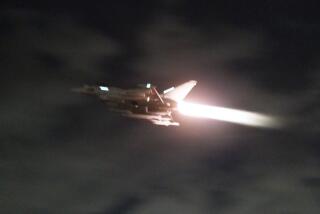Weinberger Cites Aid by Gulf States : Implies Saudis and Kuwait Provide Copter Base Help
- Share via
WASHINGTON — Defense Secretary Caspar W. Weinberger on Sunday rejected as “rumors” reports that Persian Gulf states are not cooperating with U.S. efforts to clear the gulf of mines and implied that Saudi Arabia and Kuwait are helping to provide bases for minesweeping helicopters.
“We’ve had a lot of luck and a lot of cooperation from Kuwait and from Saudi Arabia and from many of our friends in the gulf, but we don’t talk about . . . operational matters,” Weinberger said on the CBS television show “Face the Nation.”
The defense secretary had been asked if he could report “any luck” in persuading either Saudi Arabia or Kuwait to make bases available for helicopters assigned to clear the gulf of mines sown by belligerents in the Iran-Iraq War.
An Irrational Enemy
Later in the interview, Weinberger said: “We are getting a substantial amount of help from many of our allied friends in the area, and it is a very important thing for us.” But he declined to give details lest they aid “an enemy that is not all that rational”--clearly a reference to Iran’s revolutionary regime.
Remarkably similar comments had come Saturday from Prince Bandar ibn Sultan, Saudi Arabia’s ambassador to the United States. The prince, appearing on Cable News Network’s Evans and Novak show, was asked about chances that Saudi Arabia would help the United States in its search for helicopter bases.
“I can assure you of one thing,” the prince said. “What needs to be done will be done to protect our area and keep the navigation, the freedom of navigation, open for everybody.”
Since the Kuwaiti-owned supertanker Bridgeton was damaged by a mine in the gulf on July 24 while flying the American flag and under U.S. Navy escort, the United States has failed to win any public assurance of assistance with helicopter bases or minesweepers either from the gulf states or from European allies.
Cites Lots of Help
Weinberger confirmed reports that Navy minesweeping operations in the gulf after the Bridgeton incident have--”with the help of a lot of people” he did not name--found “mines that Iran possesses” outside Kuwait’s harbor.
Chances that Iran is indeed the source of the mines were not challenged by Said Rajaie-Khorassani, Iran’s ambassador to the United Nations. He said in an earlier appearance on the same CBS program that his government “has had mines in the Persian Gulf because it is a war zone, and the Iraqis have laid it, and we have laid it. . . . But we did not lay them in the course of the international . . . shipping.”
Rajaie-Khorassani, whose government completed four days of naval maneuvers in the gulf on Saturday, said he believes the United States knows “if they go beyond their limits, definitely there will be a confrontation” in which Iran would be “effective and efficient.” He accused the United States of attempted “image-making” with a show of naval force in the Persian Gulf and called it “a very irrational approach to a very . . . explosive situation.”
Weinberger, on the other hand, maintained that a record of diplomatic violations, including the taking of U.S. diplomats as hostages, shows that “the Iranians are not rational.” He said the United States has beefed up its naval forces in the area because “we had a request to go in and protect” 11 Kuwaiti tankers.
200-Year-Old Tradition
“When our Navy’s had requests over the last 200 years for special protection, we have given it,” Weinberger said.
Noting that the U.N. Security Council had unanimously approved a resolution on July 20 demanding an immediate cease-fire in the Iran-Iraq War, which will be seven years old next month, Weinberger said that he expects an early U.S. request for a follow-up resolution proposing an arms embargo on Iran, which ignored the cease-fire request.
Rajaie-Khorassani said his government had “good reason not to respond” to the July resolution but added that the matter is still under study.
It was an Iraqi plane, Rajaie-Khorassani observed, that launched the May 17 missile attack in which 37 crewmen died aboard the American frigate Stark, but still the United States “is asking us to make peace with Iraq.
“It is in this context that whatever happens between our forces and the . . . military presence of the United States is fully justified, because we consider you rightly as the supporter of the aggressor,” Rajaie-Khorassani said.
Denies Causing Mecca Riots
The Tehran diplomat vigorously rejected a suggestion that Iran instigated riots last week at Mecca, site of Islam’s most sacred shrines, in which 402 pilgrims and Saudi Arabian police died.
“We did not instigate. We just wanted our Muslim brothers to demonstrate,” Rajaie-Khorassani said. “It is a very legitimate legal action, particularly when millions of Muslims have come to Mecca from different parts of the world . . . to discuss the common issues of the Muslim community.” He accused Saudi Arabia of trying to exploit the situation to the disadvantage of Iran.
A direct contradiction came from Prince Bandar, the Saudi ambassador. He said his government believes that Iranian demonstrators came to Mecca “intending to cause chaos” in an effort “to destabilize the whole Muslim faith.” He said that 85 of the casualties were Saudis, about half of them members of security forces.
More to Read
Sign up for Essential California
The most important California stories and recommendations in your inbox every morning.
You may occasionally receive promotional content from the Los Angeles Times.









